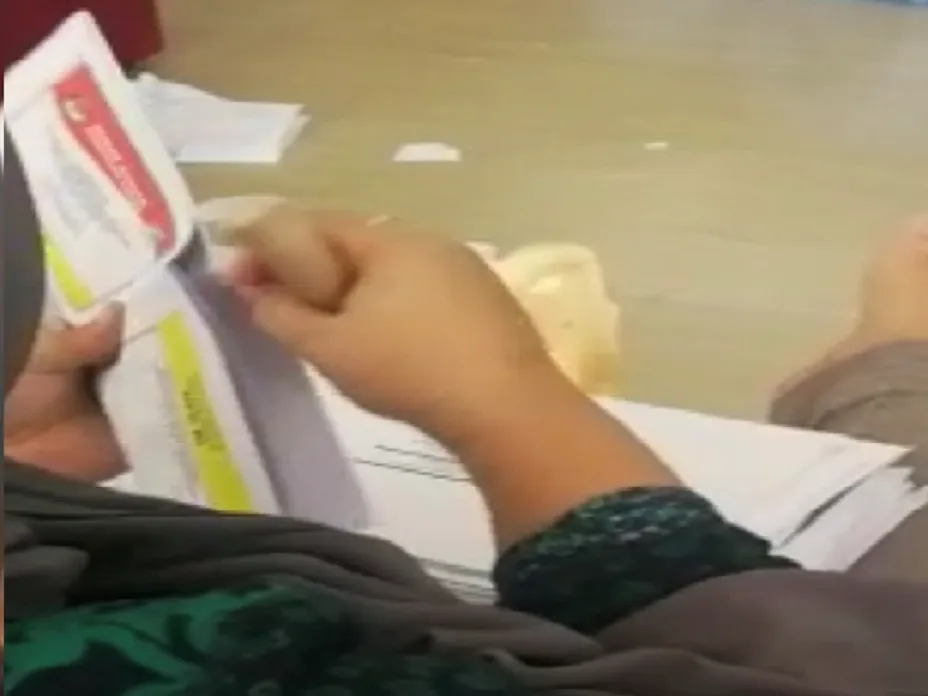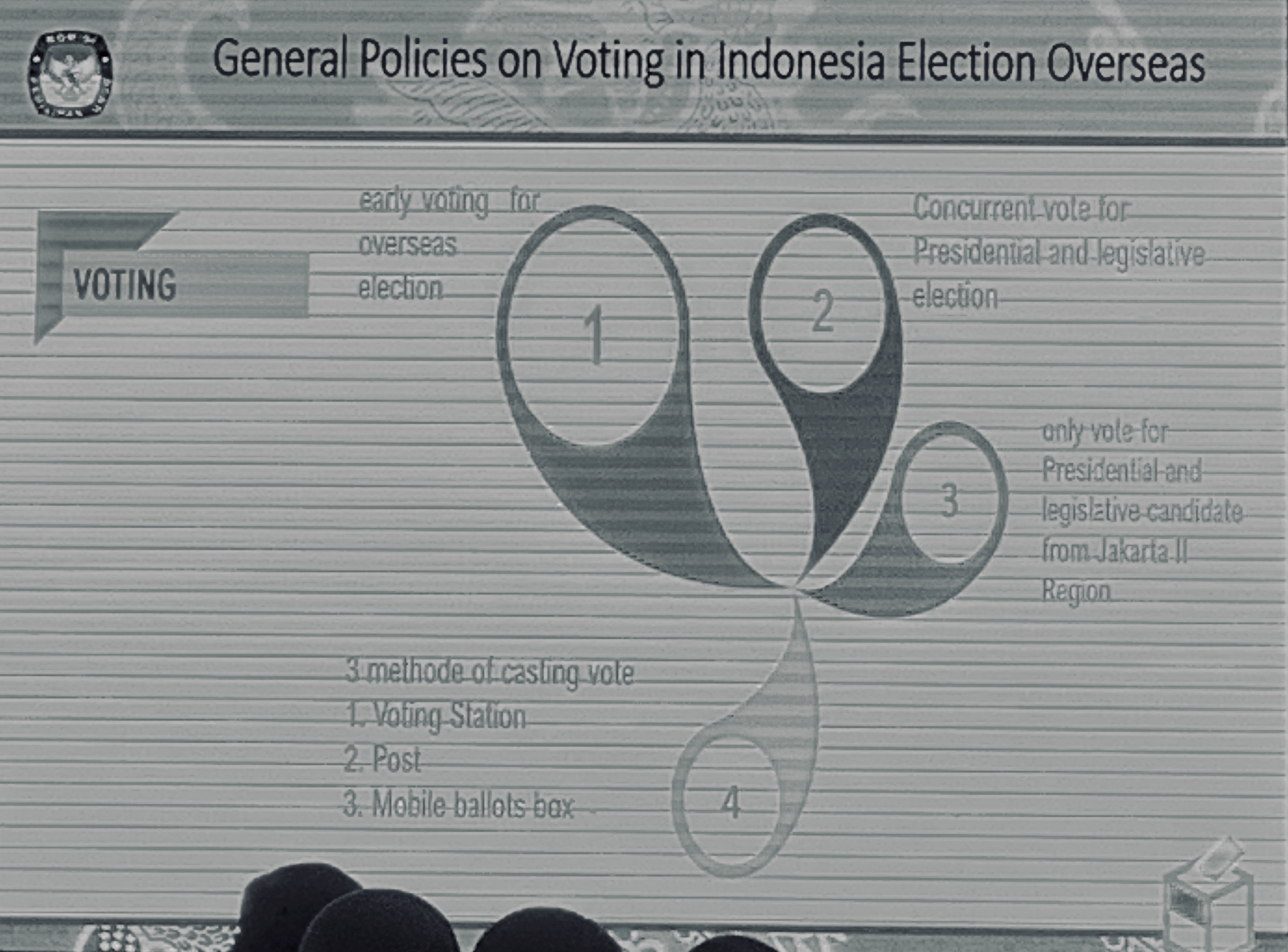The Perils of Out-Of-Country Voting: The Case of Indonesia

Disclaimer: Views expressed in this commentary are those of the staff member. This commentary is independent of specific national or political interests. Views expressed do not necessarily represent the institutional position of International IDEA, its Board of Advisers or its Council of Member States.
Indonesians, particularly those living overseas like me, were astonished on Thursday, 11 April 2019, by the discovery of pre-marked ballots in the outskirts of Kuala Lumpur, Malaysia. As per the new normal of how scandals break out in this technological age, it was first revealed by two videos on social media.
One video shows the discovery of what looked like thousands of pre-marked ballots found inside large plastic bags in an empty warehouse. The other video shows two women gently opening envelopes, taking folded ballots out of them, marking them and putting them back into their envelopes; not forgetting to reseal the envelopes with glue, of course. At least one man is also seen tampering, therefore by no means only women were involved in this scandal.
The General Elections Supervisory Commission of the Republic of Indonesia (Bawaslu) has confirmed the existence of the scandal and alongside the General Elections Commission (KPU), they are now investigating. Today, five days on, investigations have been impeded by the fact that the location and evidence connected to the alleged fraud are in the hands of the Malaysian Police. International IDEA’s Voting From Abroad Handbook, stated that the host country to out-of-country voting, in this case, Malaysia, “can help by guaranteeing certain safeguards to protect against fraud. The host country may be able to provide invaluable assistance in this regard, particularly in terms of sharing data.” It looks like Malaysia can help by letting the Indonesian electoral fraud investigators gain access to the evidence and to any other data they have gathered.
The facts of the entire scandal are still being investigated. Are they genuine ballots? Where were they obtained? Who are the people involved? Were the marked candidates actually involved? And so on. Let us wait and see. I am more interested in discussing the second video where it looks like the persons were seen tampering with postal ballots.

According to International IDEA’s Voting from Abroad Database, like 163 other countries in the world, Indonesia enfranchises its citizens living abroad to take part in at least one type of elections. Therefore, Indonesia is by no means alone. And based on its observation of comparative practices, International IDEA’s aforementioned handbook listed, among others, the following common challenges: “questions of the transparency of the voting procedures; the issue of transparency in electoral fraud; and resolution of disputes, if the elections were held on foreign ground outside the judicial territory”. These are pertinent to the case on hand, particularly the fraud committed using postal ballots. Let me explain.
Postal ballots are by nature different to in-person voting where the latter is held in a secure and contained environment with polling officers and party agents present. Everyone are therefore able to ensure see that the ballots are handled appropriately and securely put into the ballot box. In the case of postal ballots, there are many opportunities that the ballots could be intercepted between the time they were inserted into envelopes by polling official to the time they are received by the rightful voters. The same is true in the reverse where the casted ballots on the return may be intercepted and held in transit. Again, as International IDEA’s handbook warned, much of these take place on foreign land, thus there’s less control by the election organizers. Unless they cooperate closely with the host country’s authorities, there would be no control and hence, security over the ballots while in transit.
As can be seen on the video, unmarked postal ballots were being tampered with. This presumably means these thousands of envelopes have not reached their recipients yet. An interception may have occurred along the way. This method is easier than other methods of fraud such as vote buying or ballot capturing. Another question then arise, wouldn’t thousands of voters then complain of not having received their ballots? There haven’t been any yet, but if tomorrow does not go well, these complaints, when they come, may add fuel to the fire—assuming these voters exist and that the ballots were authentic.
Another problem with out-of-country voting that Indonesia experienced was the sheer number of voters. The Jakarta Post, as relayed by the Straits Times, reported that there have been unprecedented numbers of voters in Kuala Lumpur and Sydney, Australia. Judging from previous general elections where in 2014, voter turnout overseas was 33 per cent, the election organizers had not provided sufficient space for polling stations to accommodate tens of thousands of voters. In Kuala Lumpur’s case, the Malaysian authorities had not responded to Indonesia’s request set up polling stations outside Indonesian Embassy premises. Initially, 89 polling locations had been identified and announced only to be reduced the night before to only three. In Sydney, election organizers had not anticipated the number of voters and only rented the voting location until 19:00. Thousands of voters were still queuing at that time and had to be turned away. In both instances, the formal explanations have been that there were too many unregistered voters trying to vote. By law, unregistered Indonesian voters are allowed to vote with proper identification if they meet strict requirements. It appears that this was not specifically followed, but it has not been confirmed.
International IDEA’s handbook has pointed out that organizational problems is a major challenge. Without sufficient planning and voter information, it would be very easy for things to go wrong. There is indeed a tension between enfranchising citizens living abroad as manifestation of universal suffrage and the need to conduct elections with integrity. Countries choosing to enfranchise will at the same time need to overcome the challenges inherent to out-of-country voting. To help discuss this tension and other issues, International IDEA’s Asia and the Pacific Regional Programme intends on conducting a roundtable this July.
Today, at 16.00 local time, Bawaslu announced to the public their recommendations, i.e. to repeat postal voting in Kuala Lumpur involving 319,293 voters and to re-organize voting specifically for voters who lost their chance due to the truncated voting process in Sydney. KPU’s response is expected momentarily, but it appears that election authorities are doing all they can to settle matters before Election Day.
Tomorrow, Wednesday, 17 April 2019, will be Election Day in Indonesia. It is a very large and complicated elections taking place in one day. The following infographics produced by the KPU will provide you with the facts: 2019 Indonesia Presidential Elections and 2019 Indonesia Legislative Elections.




